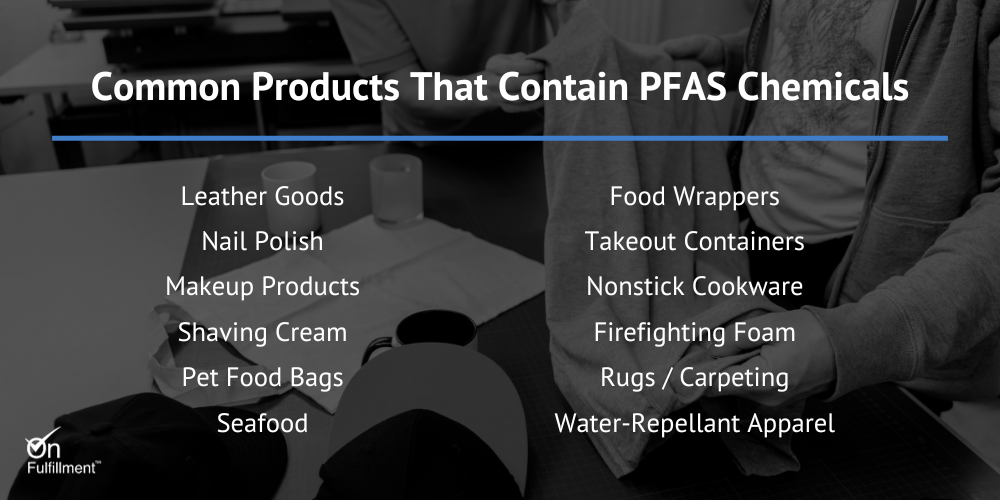If you happen to pay close attention to manufacturing regulations, you might have heard that many states across the U.S., as well as federal, tribal, and local governments, retailers, and popular brands are acting quickly to address the PFAS crisis.
PFAS, which stands for per- and polyfluoroalkyl substances, are a group of human-made chemicals that are widely used in various industrial and consumer products. Introduced in the 1940s, these chemicals are known for their unique properties, particularly resistance to heat, water, and oil—all of which have made them valuable in a range of applications, including firefighting foam, electronics, food packaging, and—of particular interest to OnFulfillment—manufacturing.
Unfortunately, over the past several years, PFAS has emerged as a significant environmental and health concern for a number of reasons. First, they are highly persistent in the environment. That means they don't break down easily and can accumulate in soil, water, and living organisms—including human beings and animals—over time. These chemicals can build up in our bodies, resulting in potentially serious health problems. These problems include elevated cholesterol levels, detrimental impacts on the immune system, and an increased risk of certain types of cancers.
PFAS has notably been found in drinking water supplies, particularly in areas near manufacturing and other industrial sites as well as near military bases where firefighting foam containing PFAS was used. Unfortunately, this contamination is widespread and will cost taxpayers billions of dollars to clean up.

Reaction to PFAS
Given the environmental and health concerns surrounding PFAS, many states, along with numerous large companies, are taking steps to reduce or eliminate the use of these toxic “forever” chemicals and find alternatives that address contamination and mitigate their long-term impact.
For instance, Maine and Minnesota have adopted policies that ban all uses of PFAS in carpets, rugs, apparel, textile furnishings, upholstered furniture, fabric treatments, and other textiles except in cases where they are necessary to ensure or protect public health. In 2022, major chemical manufacturer 3M announced that it will stop manufacturing all PFAS by the end of 2025. Other major brands taking similar actions include Deckers Brands, H&M, Home Depot, Lowes, IKEA, Levi Strauss, Office Depot, Staples, Patagonia, Polartec, REI, and Target, among many others.
It’s important to note that this effort is not limited to the U.S. Earlier this year, the European Chemical Agency also unveiled a sweeping proposal to ban the use of PFAS across the EU. The PFAS elimination movement is going global.
Failure to Comply
The penalties faced by companies that have manufactured, used, or disposed of PFAS-containing products are not insignificant. Legally, they may face liabilities and lawsuits related to environmental contamination, product liability issues linked to PFAS exposure claims, and financial responsibility for any health problems experienced by potential victims.
Those operating in regions or countries where regulations have been imposed on the use and disposal of PFAS will see the cost of doing business increase as they make the changes required to comply; the price of cleaning up PFAS contamination can be a substantial financial burden. Companies that fail to make the necessary upgrades and enhancements may be subject to fines.
 As bad as these financial penalties may be, companies associated with PFAS contamination could suffer an even worse fate: irreversible damage to their good reputation. Once the corporate image is tarnished, relationships with customers, investors, and the public at large—built over years—are hard to repair.
As bad as these financial penalties may be, companies associated with PFAS contamination could suffer an even worse fate: irreversible damage to their good reputation. Once the corporate image is tarnished, relationships with customers, investors, and the public at large—built over years—are hard to repair.
What This Means for OnFulfillment…and For You
Like all responsible companies that are concerned about the environment, OnFulfillment is fully committed to working with partners that are doing their part to reduce or, where possible, eliminate PFAS from their manufacturing processes and product lines.
We also understand that this ambitious goal cannot be achieved overnight. That means that, in the short term, we must be satisfied with best efforts to meet all current applicable laws in the U.S. and, where applicable, the rest of the world, within the established timelines.
As our brand partners work toward meeting these requirements, we accept that these efforts will have a temporary impact on some product availability. Those manufacturers who are currently transitioning to a non-PFAS product line will experience some shortages as they sell off their existing non-compliant inventory while sourcing, producing, and restocking the shelves with new materials that meet the more stringent regulatory requirements.
 As a marketing fulfillment vendor, it is our responsibility to closely monitor progress and other developments with regards to this particular effort. Fortunately, we have relationships with scores of providers for everything from brand-name apparel to branded gifts and giveaways, and we will continue to communicate with these partners to understand their relative status with regards to PFAS compliance at any given time.
As a marketing fulfillment vendor, it is our responsibility to closely monitor progress and other developments with regards to this particular effort. Fortunately, we have relationships with scores of providers for everything from brand-name apparel to branded gifts and giveaways, and we will continue to communicate with these partners to understand their relative status with regards to PFAS compliance at any given time.
For our clients, that means we can help them source and purchase the items they need, when they need them, based on their specific preferences. The key is to work closely with their dedicated customer service representative, who will conduct the necessary search on the customer’s behalf to secure the merchandise.
For instance, if they are determined to only purchase items that are PFAS-free, we can identify and work with vendors who are further along the compliance path. If the specific item or brand they want isn’t available, we can help them find an acceptable alternative that meets the regulatory guidelines.
If the specific brand or product is more important than PFAS compliance, we will scour our sources to locate those materials; if they exist in inventory anywhere, we will find them, even if it requires working with multiple vendors. At some point, those supplies will be exhausted; when they are, the search for PFAS-compliant replacements will begin.
Keeping Abreast of PFAS Compliance
As you can imagine, the current situation is fluid and changing all the time. We encourage our customers who are concerned about PFAS regulatory compliance to check in with us on a regular basis for updates.
If you haven’t considered the impact of PFAS on your branded merchandise and apparel purchases and would like to learn more, we’d be happy to educate you. If interested, we can also discuss our other marketing and event fulfillment services, including printing, shipping, storage, pick-and-pack and assembly, event management, and more.



